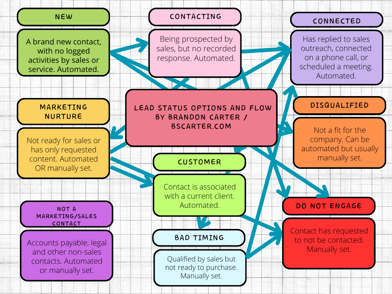Recent months have seen a slow drip of rumors and articles about Google acquiring HubSpot. After 20 years in marketing, including 10 focused on PR and 13+ working closely with HubSpot, I can tell you this acquisition is happening.
In fact it's probably already 99% done and all that's left is tiny details. I'm expecting a formal announcement soon.
So what does this mean? Here are my thoughts.
Completing the Business Suite
Despite decades of flinging random apps at the wall, a CRM is a pretty significant tool that Google has never really approached. It makes a lot of sense though, if you think of the Business Suite, or the basic essential tools any business needs to operate day-to-day.
- CRM
- Communications/Messaging
- Meetings
- Marketing Automation
- Word Processing
- Spreadsheets
- Data Storage
- Presentation
- Notetaking
In an ideal world one company can sell you all of these things. Microsoft, Adobe, Oracle, Salesforce - all have tools that can fill most of these gaps, either homebaked or through acquisitions.
By adding HubSpot into the Google Workspace suite of apps, Google fills several of those gaps, primarily the CRM. Theoretically, a business can cut one check to one company for all their needs.
Acquire vs Build
HubSpot has surprisingly few acquisitions in its history, just 12 in 18 years of business.
Oracle meanwhile has 142 acquisitions. Salesforce has 59 and Adobe has 40.
Google, to date, has 260 acquisitions.
Predictable Income, Even if AI Tanks
HubSpot has grown steadily and consistently for 15 years, the point where it's now the most popular CRM in the world (thanks in large part to a nice free product). It's a proven commodity for small businesses and is quickly moving on par with Salesforce for Enterprises.
Google Workspace itself is a proven winners with 10 million clients. But Google has had some fissures lately as it struggles to gain traction with AI. AI itself is likely to replace a number of office tools in the future, and a new player (OpenAI) appears ready to capture much of the scene.
HubSpot provides a proven winner (that has its own AI tools that are...okay) in the suite that can boost revenues across the board. If nothing else, its buys Google some time to master AI or otherwise develop revenue around their Gemini and Vertex AI suites.
Ad Dollars and Attribution
Of course advertising is still Google's cash cow and it makes sense to give clients a closed loop wherein prospects lured in from ads can slip easily into a CRM that already has clear attribution functions and pre-built Google Ads integrations. You can generate campaigns and make purchases from within HubSpot's interface.
Another big bonus: HubSpot cookies are considered first-party cookies and are therefore protected under Google's own coming cookie rules phasing out third party cookies.
Partner Ecosystems
Both Google and HubSpot have mature partner ecosystems, both of which I'm well-versed in. These companies, which exist to service, sell, and support Google and HubSpot services, generate billions in revenue while also allowing each company to save on client success functions like support and onboarding.
For HubSpot partners, the platform (likely the free version) is about to be placed in the hands of the 9 million Google Workspace clients, which means opportunities for upgrading and upselling. For one, HubSpot currently requires new clients to undergo paid onboarding, which can be waived if the client works with a partner. Many of these clients continue to utilize a partner for ongoing marketing automation support, or just outsource the function altogether.
Of course, Google Partners can build out the same functions within their scope as well. And HubSpot partners may choose to build out Google-specific functions, which obviously opens up new revenue paths around Workspace and Google Cloud Platform alongside advertising.
What Could Go Wrong
Big companies are notorious for acquiring new toys and letting them rust. Marketo hasn't improved (or even changed) at all since being acquired by Adobe and Pardot is like a forgotten stepchild to Salesforce. Google's graveyard is littered with acquisitions that once held promise but eventually petered out.
That's very possible with HubSpot. Which would be a shame, because right now they're shipping new features at a pace I've not seen in any SaaS platform. And it's good stuff too, not like HubSpot's old ways of rolling out a feature a year too early (Service Hub). Their model of dedicated product teams for specific functions is unusual (for example, they have a team that just manages the Imports tool) but likely to be seen by Google as overkill. And those are the kind of decisions that lead to stagnating software.
There are other concerns. If Google wants to be petty they can limit HubSpot users' ability to manage Meta and LinkedIn ads. That's doubtful (revenue is revenue, even when competitors are sharing in it). Google might also force HubSpot into a per-user model might price most small businesses out of the market, assuming it may want to include paid HubSpot portals in the higher tiers of Google Workspace.
Get Ready
This acquisition is happening, barring some sort of regulatory interference. And in that case, there are rumors of yet another big buyer who would be in line. So HubSpot will probably be folded into another massive tech company's ledger at some point in the next year.
If you're a HubSpot user, not a lot will change...but don't get used to the current state of rapid product improvement. The platform is likely to be bundled with Google Workspace, so if you're already on an Enterprise tier for that, you may actually save some money on HubSpot. Otherwise, pricing is likely to become heavy on the per-seat, which may or may not work for you.
The integration between the two platforms is likely to become seamless - which is great, as there currently is no native integration with Google Chat, and limited functionality with Meet. Conversely, the Office 365 integrations will be deprioritized, at best.
It's possible you may choose to reevaluate your commitment to HubSpot in general. As Google and HubSpot continue to pursue bigger Enterprise clients, smaller, vertical-focused CRM/MAPs are popping up in its wake. You might find yourself checking out things like Inflection.io, Queue, Bonsai, RedTail, or cook up your own thing in Notion.
If you're a partner in either company's ecosystem, there's a lot of revenue to be made from managing a client's total business desktop. For HubSpot partners (many of whom are Google Ads partners), there's an opportunity to explore partnering with the Google Cloud side. For current Google Cloud partners selling and servicing Workspace, HubSpot requires personalized onboarding and ongoing attention, making it a potentially lucrative source of recurring revenue.
Either way, I'm familiar with both ecosystems and am happy to help. Reach out!
Tags:
HubSpot ConsultingJun 13, 2024 10:08:42 PM



